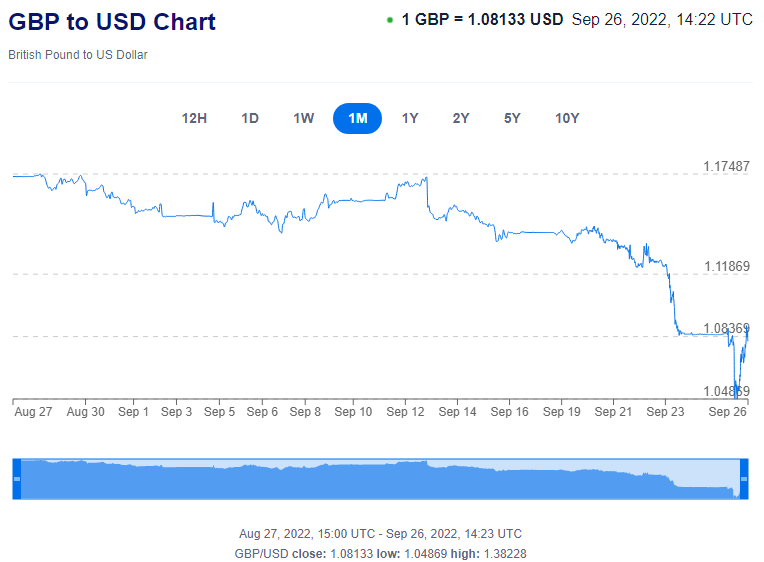The pound fell to $1.033 in early trading this morning before rebounding to the still-ahistorical $1.08 by mid-day:

Chancellor of the Exchequer Rishi Sunak hasn't had the job for three weeks and he's already tanked British currency markets. The Guardian's economics editor Larry Elliott calls the mini-budget that started this catastrophe a "schoolboy error:"
Part of the story of the pound’s weakness is a function of dollar strength but that does not explain why sterling has fallen so rapidly since the end of last week. There are three UK-related factors behind the fall.
First, once a currency hits the skids it is hard to stop it. Momentum trading took over in the aftermath of Kwasi Kwarteng’s mini-budget and it has proved hard to halt.
Second, Kwarteng committed a schoolboy error by pledging further tax cuts in a full budget planned for later this year. If the markets are worried about the state of the government’s finances and the increase in borrowing needed to fund your plans, it is not the wisest course of action to add to those concerns. Kwarteng’s inexperience has been exposed.
Third, the financial markets don’t really know how the Bank of England will respond to the events of the past three days. Threadneedle Street raised interest rates by half a point last Thursday but there has been speculation of an emergency meeting of the Bank’s monetary policy committee as early as Monday.
The Economist expands:
Five-year British yields have risen from 1.5% at the beginning of August to above 4.5% now: an increase of about one percentage point in just two days.
That combination of rising yields and a falling currency has prompted discussions of a broader crisis of confidence in Britain’s economy and its assets. The government’s tax cuts will mean a growing budget deficit and higher public-debt levels in the future. Britain’s current-account deficit reached 8.3% of gdp in the first three months of the year, the deepest in modern history, driven by surging energy prices. A gaping current-account deficit is something that often worries those who invest in developing economies.
But in other ways Britain is an unusual candidate for a currency crisis. Its exchange rate is flexible, meaning that there is no link to another currency, as was the case when Britain was forced out of the European Exchange Rate Mechanism in 1992. Its financial markets are deep and sophisticated. It has minimal debt denominated in foreign currencies, and its central bank is independent from the government.
The most simple explanation for the sell-off, then, is that investors do not believe that the government’s tax cuts will lead to the real economic growth Mr Kwarteng wants. Instead, they foresee higher inflation that the Bank of England will be unwilling to fully offset with interest-rate increases. Currency analysts at the Bank of America suggest that a combination of Britain’s changing fiscal stance and the long-running effects of its decision to leave the European Union have led to a profound rethink of the pound by investors. That leaves the currency more vulnerable in the years ahead.
I was joking with friends that I should hop over there to finally get a pint and a bap for under $10, until one of them pointed out that it would be a $1210 pint and bap given airfares and hotel costs. Ah, well. It doesn't look like the pound will recover before the end of the year, so maybe Christmas in London again? Any bets on whether PM Liz Truss will have to call an election before then?
Others have commented
David Harper
Point of information from one of your readers in the UK. The Chancellor of the Exchequer is Kwasi Kwarteng, not Rishi Sunak. It's an understandable mistake. We've had three Chancellors in as many months (Nadhim Zahawi kept the comfy chair at Number 11 warm over the summer) so it's rather confusing for everyone.
Copyright ©2026 Inner Drive Technology. Donate!